Dear Miss Addams,
Is it possible for a person unknown in the World-of-doing-things, to get possession of your time for a few moments, in order to put before you a peace [program] which I am very sure you will think logical and possible? At least with all my soul, I would like to get these ideas before someone who combines, as you do, interestedness and capacity.
With the hope therefore that this letter will reach your eyes, I will go on to ask why it is that this country must jump at one of two conclusions; one of these being that warfare among nations is necessary and the other that peace can be secured by disarmament?
Cities find it necessary to employ a Police force, which is devoted to the safety and safe-acting of [its] citizens. The police is not paid to indulge in brawls or [partisan] fights but is supposed to suppress such by peaceable means if possible.
To further illustrate the points I am about to make, I will say that the size of the big policeman would help him very little had he not the law behind him. [page 2]
It is the power of the authority he carries which makes him an awesome person to the would-be criminal.
Now let us suppose that the Army and Navy of our country should be employed for the purpose for which ethically they are intended.
This force would then be divided into two sections. The first and smaller part would be used in the United States to quell riots, to bring order out of chaos during great disasters (such as the San Francisco earthquake, Galveston flood etc.) to look after our cables, build "Panama Canals", and do all the grand work that our Army and Navy does in our country and along our coasts.
The second section might be of considerable size, but for reasons which I shall give, still smaller than our present fighting force. This "second section" would belong, not to us, but to "The Police of the World", for each civilized nation would contribute to the world police according to [its] size and strength.
The Army and Navy contributed by our country would never be stationed in the United States or in any of [its] possessions but would always be garrisoned in foreign countries; being moved from one section of the world to another just as our Army is at present moved about within our own dominion.
Our Navy instead of being stationed a part of the time on our coasts, would be stationed the entire time on foreign coasts. [page 3]
It would be the same with the Army and Navy of each nation contributing to the World Police or World Army.
This World Army and Navy would be officered internationally or with officers picked from the various nations represented, and the patriotism impressed upon [its] members would be an International Patriotism. If such a thing as a personal, Own-country Patriotism was indulged in, it would necessarily take the form of representing one's own nation as conscientiously as possible in the cause of Brotherhood or World Peace.
We will now suppose that all of the politically important nations of the world have contributed men and money to the [maintenance] of a World Army, and that, with this World Army in existence, one of the nations represented, makes a demand of another nation which the latter considers unjust. What then happens? The two, having no opportunity to settle their dispute by means of arms (their fighting force being distributed in foreign countries under International command) are forced by circumstances to submit their grievances to an International Tribunal maintained for the purpose of settling such disputes.
The two nations are expected to accept the decision of this court of appeals just as we individuals in a city are expected to abide by the decision of those appointed from our midst to settle civil controversies.
If one of the two disputing nations <refuses> to accept the decision of the International Tribunal, then that section of the World Army which is stationed in the rebellious country, takes over the offending government and holds it until its people are brought to the condition of reason or a state of obedience. [page 4]
An individual family in a city does not employ a private policeman to fight for it or to bully everyone who doesn't agree with it. Yet nations are doing just that thing.
The police of a city or of a country is supposed to belong to no one and to everyone. It exists to help enforce a country's laws. Armies and Navies should be used to enforce International laws for the benefit of the world at large.
If the civilized nations of the world would combine their forces, each country would be saved huge expense. It goes without saying that the combined Armies and Navies of the present Big Powers would make a far larger World Army than would be necessary.
There is a great deal that could be said on this subject from many standpoints beside those of humaneness and economy. For instance the intermingling of the nations in this large movement for the Peace and Betterment of the world, would enlarge and broaden the viewpoint of each and every nation.
Miss Addams, this letter is written by one who has felt the horror of war. Through the Spanish-American War I lost an adored husband and a grand, good father, <both of whom> passed out by the door of anguish unspeakable. One of my sisters also became a widow, her husband being shot on the battlefield leaving a little baby, born during his absence.
For your grand and earnest work I thank you in the name of every maimed and broken man, every fatherless child and every weary and sad-hearted woman brought to this condition by the horrors of war.
Yours truly,
Lucy K. Kellogg [signed]

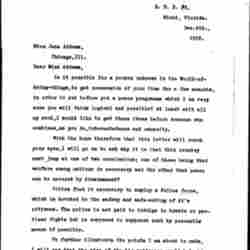
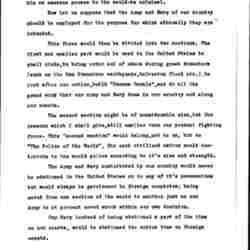
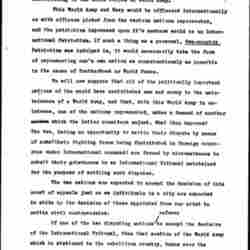
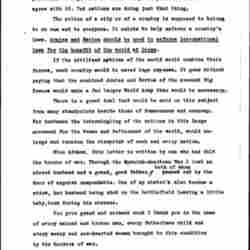












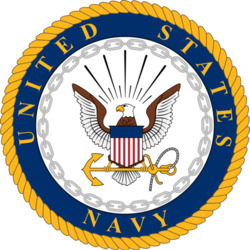
Comments